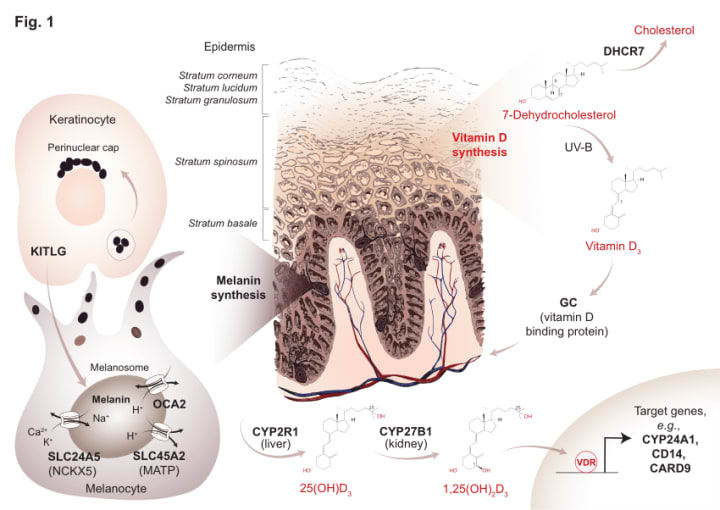Understanding Vitamin D: The Science Behind Our Genetic Differences
Exploring the Genetic Tapestry of Vitamin D: How Ancestry Shapes Health Through Sunlight and Synthesis

The synthesis of vitamin D and its impact on health varies significantly among individuals. This variation is influenced by genetics, skin pigmentation, and ancestral origins. Understanding these differences is crucial for anyone interested in vitamin D and its role in health.

The Importance of Vitamin D Levels
Vitamin D is essential for various health functions, including bone health, immune response, and metabolic processes. However, studies on vitamin D levels and health outcomes have historically focused on specific populations, often overlooking the genetic diversity among different ethnic groups. As a result, the implications of vitamin D levels can differ greatly among individuals based on their ancestral backgrounds.
Genetic Factors and Skin Pigmentation

Many people are aware that skin pigmentation affects the ability to synthesize vitamin D from sunlight. However, fewer people know that genetic variants can influence vitamin D levels independently of skin pigmentation. These genetic differences mean that blood levels of vitamin D can have varying health implications depending on one's ancestry.
Human Migration and Genetic Diversity
To understand these differences, we need to delve into human history and migration patterns.Geneticists generally agree that humans originated in Africa, with groups migrating to different parts of the world over tens of thousands of years. This migration led to genetic divergences that still affect us today.
Genetic Mutations and Selection
Mutations occur in human populations and can be harmful, neutral, or beneficial. Beneficial mutations are often spread through a population via natural selection. For example, genes related to skin pigmentation and vitamin D synthesis have been selected for in different populations based on environmental factors.
Vitamin D Synthesis and Genetic Variants
Research has shown that certain genetic variants, such as those in the MC1R gene associated with red hair and fair skin, have been selected for in populations to adapt to varying levels of sunlight. These adaptations have led to differences in how efficiently various populations synthesize vitamin D.
The Role of Neanderthal Genes
Interestingly, some genetic variants influencing vitamin D synthesis and skin pigmentation in modern humans were inherited from Neanderthals. These variants are present in both Europeans and East Asians, illustrating the complex interplay of genetics in our evolutionary history.
Vitamin D and Health Outcomes
The impact of vitamin D on health is not uniform across different ethnic groups. For example, people of African descent are generally more resistant to decreases in bone mineral density from low vitamin D levels compared to those of European descent. This resistance suggests that the optimal vitamin D levels may vary among different populations.
Bone Mineral Density
Bone health is one of the primary reasons vitamin D is crucial. However, studies indicate that the effect of vitamin D on bone mineral density varies.

People of African descent, including African Americans, are more resistant to low vitamin D levels affecting their bone density, whereas Europeans and Chinese individuals are more susceptible.
Immune System and Disease Resistance
Vitamin D plays a significant role in the immune system, affecting responses to infections and autoimmune diseases. In Canada, for instance, people of European descent benefit more from vitamin D supplementation for immune health than native Canadians. Moreover, vitamin D levels are linked to multiple sclerosis risk in white individuals but not in blacks and Hispanics.
Metabolic Health and Diabetes
Vitamin D levels are also associated with metabolic health. In the U.S., low vitamin D levels correlate with a higher incidence of diabetes in Caucasians and Hispanics, but not in African Americans. This discrepancy highlights the importance of considering genetic background when evaluating vitamin D's role in disease prevention.
Cardiovascular Health
Cardiovascular diseases, including heart disease and stroke, show a similar pattern. Low vitamin D levels are associated with higher cardiovascular disease incidence among Europeans and Chinese, but not among Hispanics and Africans. This finding underscores the need for tailored health recommendations based on genetic and ancestral backgrounds.
Moving Forward
Understanding the genetic basis of vitamin D synthesis and its health implications is crucial for personalized medicine. Most research on vitamin D's harmful effects has focused on people of European descent, leaving a gap in knowledge for other populations. As our understanding of genetics and vitamin D evolves, it is essential to consider these differences in health recommendations and research.
In future discussions, we will explore how to optimize vitamin D levels for different ethnic groups, considering their unique genetic backgrounds and health needs. This approach will help ensure that everyone can achieve optimal health outcomes based on their individual genetic makeup.
Conclusion
Our genetic diversity has led to significant differences in how we synthesize and respond to vitamin D. These differences, rooted in our evolutionary history and migration patterns, mean that vitamin D levels have varying health implications across different populations. By recognizing and understanding these genetic factors, we can better tailor health recommendations and improve overall health outcomes for diverse populations.
About the Creator
Mojalefa Mokoena
Discover the world through the eyes of Mojalefa Mokoena, a passionate storyteller from the heart of South Africa. Mojalefa's narratives blend cultural richness with contemporary insights, offering a unique perspective on global themes
Enjoyed the story? Support the Creator.
Subscribe for free to receive all their stories in your feed. You could also pledge your support or give them a one-off tip, letting them know you appreciate their work.






Comments (1)
excellent article